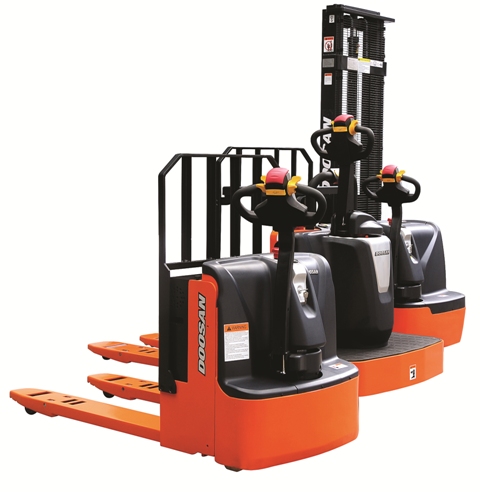 Doosan electric pallet walkers |
Warehousing has become a growth industry over the past few years. Unprecedented global online sales and burgeoning third-party logistics enterprises have forced warehousing and its associated materials handling equipment suppliers to improve efficiency, flexibility and adaptability.
Melissa Barnett looks at the warehouse workhorses to see how they have met the challenges.
Warehouse basicsWhile warehouses and the warehousing sector grow in size, growth is dictated by some harsh realities, including the cost of real estate, fuel, wages and just-in-time delivery expectations. These pressures often influence what equipment and management systems are employed on the warehouse floor, making it crucial that buyers "know their business".
Knowing the product specifics such as size, weight, shape, pallet dimensions and type are vital, suggests Jaekwang Lee, spokesman for Korean forklift manufacturer Doosan. He adds that knowing how fast or slowly a product moves through the warehouse system also helps to choose the correct machine for the job.
Bart Verbeke, business development manager for TVH agrees: "Choose the warehouse equipment which is best (suited for) the intensity of the job." Verbeke adds that customers must also pay attention to ergonomics to maximise operator safety and efficiency.
Xiaojun Pan, spokesman for Chinese manufacturer Zowell, points out that the most suitable equipment may not be the most expensive; durability and reliability should be taken care of first and then price. As important, he believes, is after-sales service, including the manufacturer's ability to provide spare parts, quick service, trained service technicians and up-to-date service vehicles.
Jan Kaulfuhs-Berger, spokesman for Jungheinrich, believes that working with one main contractor who can design and supervise the whole material flow in a warehouse - regardless of whether it is automatic, semi-automatic or manual - ensures high process stability. Good integration and addressing customer requirements are vital, he stresses.
IntegrationCan manually operated forklifts, automated equipment and warehouse management systems (WMS) live in harmony on the warehouse floor? Automated guided vehicles (AVG) were once a novelty in warehouses and seldom the warehouse equipment of choice for small to medium-sized operations. So too were WMS and warehouse control systems (WCS).
That is changing. As warehouses become larger and strive for greater efficiency, there is an increasing number of AVGs and WMSs sharing the floor with conventional warehouse forklifts, and they all seem to be getting along just fine.
One reason for this is that warehouse forklifts are becoming more technologically advanced. Terry Althus, project manager for Linde, South Africa, says, "The development of automated equipment is continuous and more companies are utilising technologically advanced materials handling equipment (MHE)." Most of the recently developed materials handling equipment includes built-in automation technology such as guidance systems, height selection controls, synchronous rotation on turret-heads, fork cycle control (picking up and putting away of pallets in rack positions) and automated battery changing stations.
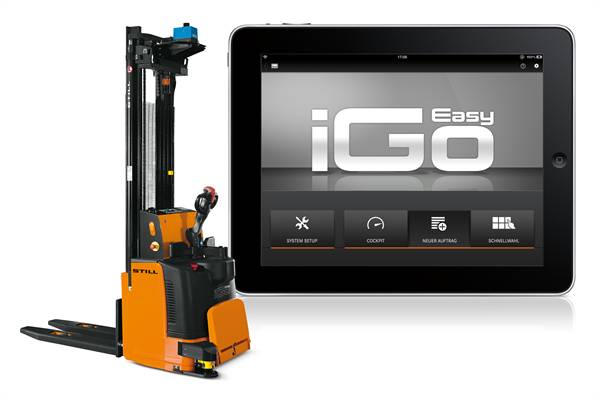 STILL's i-Go-Easy |
Christian Baerwolff, head of marketing for STILL, believes there is a general trend towards automated solutions, but integration is proceeding slowly. For this reason, STILL continues to automate standard trucks. " These trucks are then fit for dual-purpose (application). They have the benefits of manually operated forklifts and the advantages of automation," he says. The STILL iGoEasy system, which is installed in the dual-purpose forklifts, is unique because it can be easily operated, installed and adapted with an iPad. "This makes automating more interesting to smaller companies," says Baerwulff
Lee says that Doosan warehouse equipment comes with an interface for a terminal, scanner and printer so that dealers can easily install the best solution for each application after sale, allowing the end-user to choose the technology that best suits their needs. Many earlier warehouse equipment models can be retro-fitted with suitable WMS technology.
Chinese manufacturer Zhejiang Hangcha doesn't currently provide in-house WMS or WCS offerings, but prefers to co-ordinate with a third-party logistics planner and the customer to provide the best solution. As spokesman Isa Zhang points out, "There are still applications in the warehouse which automation can't do and manually operated equipment is required." One such application is loading and unloading containers. Up to 80% of warehouse activity takes place in the shipping/receiving/staging areas and manually operated forklifts are best equipped to deal with non-routine or one-off activities.
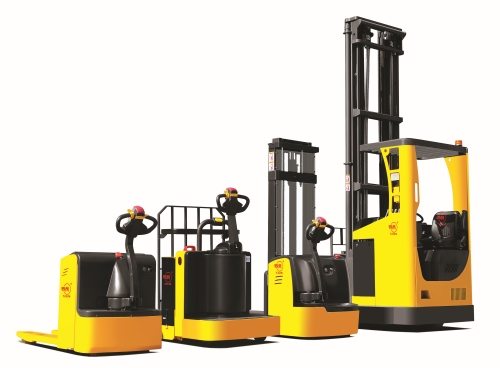 Ruyi's pallet mover and stacker range |
Chu Jiang, vice-president of Ningbo Ruyi, agrees. "AGVs have a very limited mobility. They also have a limited range of use which is unable to meet most people's demands and which most operators are not sufficiently trained to provide."
Best sellersWarehouse operations are complex spaces and there is seldom one piece of materials handling equipment which covers all contingencies. For this reason, there is a bewildering range of equipment on offer including pallet handlers, ride-on pallet stackers, reach and multi-way trucks and order pickers, as well as 2-3 T (4,500 lb. - 6,500 lb.) forklifts in both electric, LPG and diesel, pneumatic tyre and cushion tyre.
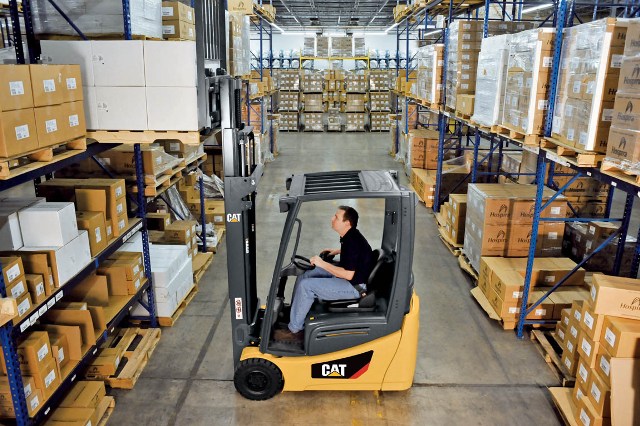 CAT ET4000 Supplied by Hewitt equipment |
Forkliftaction.com News asked a number of forklift manufacturers, dealers and suppliers what were their best sellers and in what type of warehouse environment they might be found working. Jean-Pierre Brousseau, regional sales manager for Canadian dealer Hewitt Equipment, says that the number one product in the warehousing industry is electric hand pallets, with electric counterbalance forklifts coming in a close second. "These two products are highly sought-after in the warehousing industry and represent more than 60% of our market." Brousseau adds that going green is also a winner with a large warehousing client of Hewitt's recently converting his entire fleet of propane fuelled forklifts to electric.
Lee says Doosan's biggest seller is the BW23S-7, 4,500 lb. (2 T) - 6,500 lb. (3 T) series walkie stacker. "This product is used by everyone, from small retailers to large distribution centres." He adds, "The larger, BWR33S-7, 6,500 lb. (3 T) walkie-rider pallet truck can increase efficient stock retrieval by becoming a low-order picker for fast moving items and do 'double duty' loading and unloading trailers on the dock."
Italian manufacturer ICEM has a unique range of warehouse equipment, but spokesperson Elena Rondinini says that its most innovative product is the TP40-100 series pallet truck for high-capacity environments. "This product, which is a fraction of the cost of a forklift, is used in the heavy metal industry to load sheet metal coils onto presses. ICEM's very high pallet loader is used in the glass, marble and paper industries, where it is appreciated for its strength and reliablity.
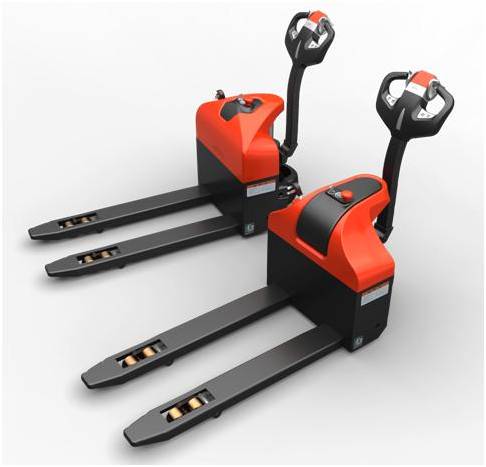 Hangcha mini-pallet movers |
Zhang tells Forkliftaction.com News that Hangcha's mini-range pallet truck is its most successful warehouse unit. "The mini-range pallet truck comes at a very competitive price compared to the standard pallet truck or pallet stacker. The maintenance-free battery and internal charger provide convenient operation and often replaces the semi-electric pallet trucks available on the Chinese market."
Efficiency and accuracy are important considerations in any warehouse. Dutch company Ravas designs and manufactures mobile weighing scales for integration into warehouse materials handling equipment, from hand pallet trucks to forklifts. One of Ravas' customers, DSC Logistics in the USA, a 3PL company operating in packaged goods, electronics, paper products and tobacco, equipped 50 order-picking trucks with mobile scales. The purpose was to reduce picking errors and to reduce the time-consuming task of checking each finished pallet on the shipping dock. Jim Chamberlaine, senior director at DSC Logistics, believes the scales have done much more than that. "In addition, operators can now be evaluated and made aware of errors using the Accu-Pick paperless system, resulting in a higher level of discipline, more accuracy and a higher pick rate per hour."
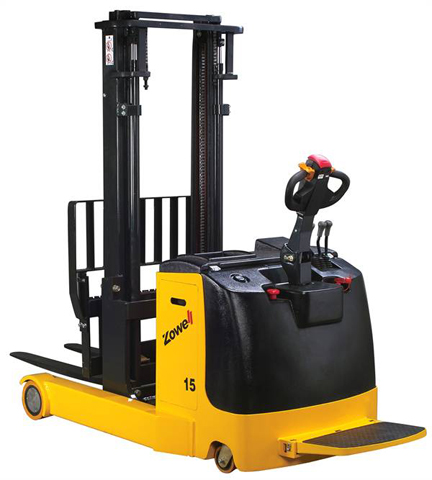 Zowell's XR series electric stacker |
Pan says Zowell's best-selling product is the XR electric stacker because it resolves the bottom stand problem of most electric stackers, in which only one side pallet can be used. The forks for the XR model are adjustable and can be used for both single- and double-faced pallets; furthermore, there are no legs at the front of the stacker to block the forks when they slide under the pallet. The forks on the XR also move forwards and backwards with the help of a centered reach cylinder.
TASK Australia also designs a pallet stacker with no legs, the BOA. Ben Rainsford CEO of TASK, says "the TASK BOA is very successful because of this feature.'Our other best seller is the Viper, a reach pedestrian stacker, which we believe is the only reach truck in the industry that is able to reach its full retained capacity to full height. The Viper is also capable of becoming a legless stacker when the mechanism is in use."
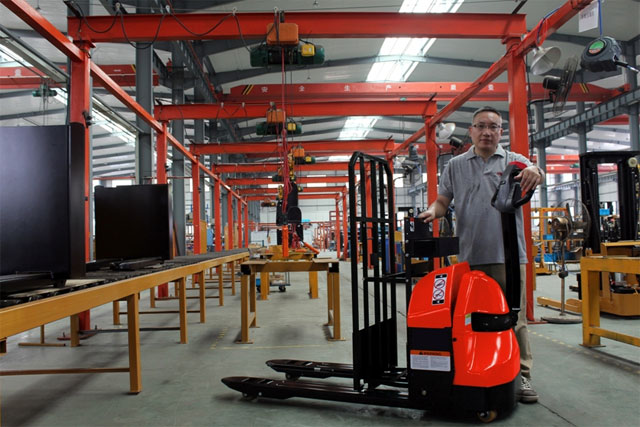 President of EP Forklifts Jinhui He |
Jinhui He, president of EP forklifts, says the E-truck is EP's best sell-seller because of its ability to get the most out of very limited spaces, but he believes EP's most innovative offering is the CK05 stock-picker due to its cross-over design between a pallet stacker and a ride-on forklift, ensuring highly efficient, cost-effective small/middle picking capability.
Altus says that in South Africa, Linde's most successful warehouse forklift is either the reach truck or turret truck, "the reach truck, because it is the most commonly sold, the most versatile and value for money. It is also adaptable to both ambient and cold storage environments and has readily available spare parts and service technicians. We currently have a factory-modified Linde cab reach stacker working in a freezer facility at -60°C (-76°F). The driver operates comfortably in his normal clothing." However, she adds, "the turret trucks can be used for full pallets and as order pickers. They can be fully customised to suit other applications, have extreme height capabilities (17 m/55.7 feet), can be automated and can also adapt to both ambient and cold-store applications."
The most successful type of warehousing equipment at Ruyi says Chu, is the electric forklift. "It not only has a simple and smart design, but also has a full set of functions, a long service life and simple maintenance."
Future of warehouse forklift equipmentObservers say that warehouse equipment sales are the most resilient in the materials handling sector and most of those interviewed for this feature seem to agree. Brousseau says, "Warehousing represents more than 7,000 companies in North America. For the most part, warehouses tend to work long hours and, as a result, (forklifts) are in high demand - although the recession saw a marked slow-down."
Verbeke believes that there has been a small increase in small MHE sales, but he puts this down to them being a less risky investment. "The market is more careful on big investments," he says.
EP's He believes that creativity and innovation are essential in maintaining market resilience. "Customers will always want something to solve their logistic problems," says He. "We need to create new and innovative categories for those needs."
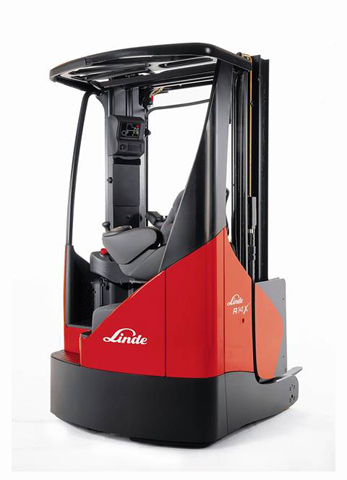 Linde reach stacker |
Althus is seeing electric warehouse forklift volumes growing in accord with European and US market trends. "As areas become more developed and inhabited, there is greater demand for product and product availability - this creates moves to warehouses with greater capacity on a smaller footprint. In order to meet the requirements, warehouse operations are changing to narrow-aisle and higher racking spaces, and the materials handling equipment must develop to address these changes."
Lee agrees and adds, "Warehouse sales are being driven by the need for more dense storage and the increasing market for electric versus IC-powered equipment. No-one can predict the future, but I believe (that) in a decline, warehouse equipment would be the last segment to go."
Additional information by our contributors:TASK FORKLIFT'S ENHANCEMENTS TO THE VIPER PEDESTRIAN REACH TRUCK
Task Forklifts Pty Ltd:
website,
ShopFront------------------------------------
HEWITT EQUIPMENT LIMITED: OVER 60 YEARS OF MATERIAL HANDLING EXPERTISE
Hewitt Equipment Limited:
website------------------------------------
NEW LAUNCH OF HANGCHA A SERIES WAREHOUSE EQUIPMENT
Zhejiang Hangcha Imp. & Exp. Co.,Ltd.:
website,
ShopFront------------------------------------
PALLET WEIGHT IS A COST SAVING TOOL
RAVAS:
website------------------------------------
TVH:
website,
ShopFront
------------------------------------
IF A REACH STACKER DOES THE JOB, WHY CHOOSE REACH TRUCK THAT COSTS MORE?
Suzhou Pioneer Material Handling Equipment & Technology Co., Ltd.:
website,
ShopFront------------------------------------
MOVE HEAVIER LOADS QUICKLY AND SAFELY WITH ICEM'S HIGH CAPACITY TP SERIES
ICEM Srl:
website------------------------------------
STILL GmbH:
website,
ShopFront------------------------------------
RUYI LAUNCHES NEW SINGLE COLUMN WALKIE STACKER - CDDRD12
Ningbo Ruyi Joint Stock Co., Ltd:
website,
ShopFront-----------------------------------
Jungheinrich AG:
website------------------------------------
Doosan Industrial Vehicle Co., Ltd.:
website,
ShopFront------------------------------------
EP LAUNCHES CPD10ET ELECTRIC FORKLIFT
E-P Equipment Co., Ltd:
website,
ShopFront-----------------------------------
Linde Material Handling South Africa:
website-----------------------------------